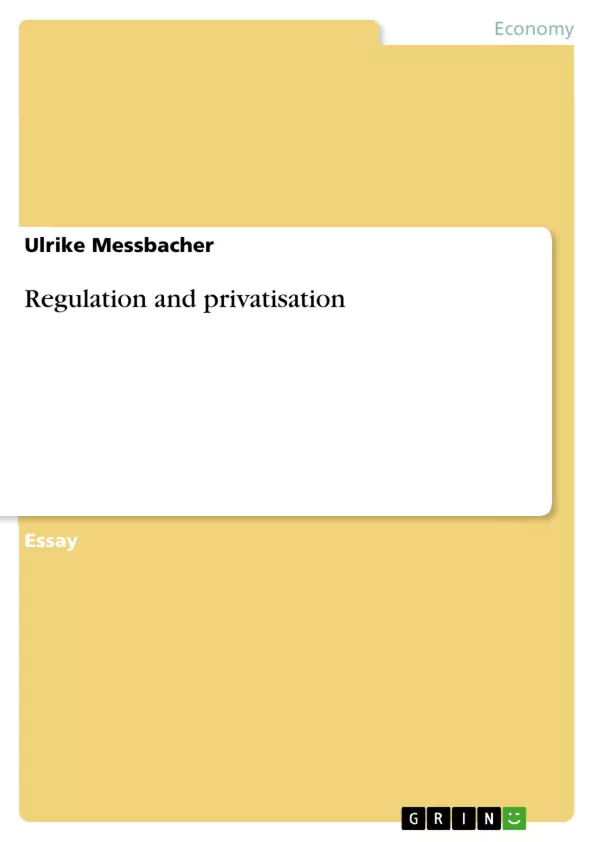The economic trend of privatisation that started in Great Britain in the early 1980s has now spread to all of the European states (www.fiwi.uni-bonn.de).
Privatisation is characterised as a change in ownership and control of an enterprise from the public sector to private sector by share flotation or private sale. In a broader sense, the definition includes the transfer of functions previously performed exclusively by the public sector to the private sector and all the other measures which aim to reduce the role of government in a national economy in order to strengthen free market economy (www.canaktan.org).
Table of Contents
- Introduction
- Reasons for privatisation
- The market forces argument for privatisation
- Outline of the understanding of market forces argument for privatisation
- Why this argument may break down if the industry is a natural monopoly
- Economic issue of natural monopoly
- Natural monopoly and the breakdown of market forces
- Carefully assess the key economic issues which regulators of privatised industries should consider
- Regulation of privatised industries
- References
- Web resourses
Objectives and Key Themes
This text analyzes the economic motivations and consequences of privatization, specifically focusing on the role of market forces and the potential for natural monopolies in privatized industries. It also examines the key economic issues that regulators must consider when overseeing privatized sectors.
- The economic rationale for privatization
- The potential for market failures in privatized industries
- The concept of natural monopoly and its impact on market efficiency
- The role of regulation in ensuring efficient and fair outcomes in privatized sectors
- The economic consequences of privatization for national economies
Chapter Summaries
- Introduction: Introduces the topic of privatization and regulation, highlighting its significance in the contemporary economic landscape.
- Reasons for privatisation: Explains the rationale behind privatization, emphasizing the potential for increased efficiency and reduced government intervention in the economy.
- The market forces argument for privatisation: Outlines the key arguments in favor of privatization, emphasizing its potential to promote competition, lower costs, and improve resource allocation.
- Outline of the understanding of market forces argument for privatisation: This section expands on the understanding of the market forces argument by providing a detailed explanation of the rationale behind this argument and its implications for the economy.
- Why this argument may break down if the industry is a natural monopoly: Discusses the limitations of the market forces argument in the context of natural monopolies, outlining why competition may not be feasible in such industries.
- Economic issue of natural monopoly: Examines the economic characteristics of natural monopolies and their implications for efficiency and market behavior.
- Natural monopoly and the breakdown of market forces: Provides a comprehensive analysis of how the presence of a natural monopoly can lead to market failures and disrupt the intended benefits of privatization.
- Carefully assess the key economic issues which regulators of privatised industries should consider: This section explores the critical economic issues that regulators must address to ensure that privatized industries operate efficiently and in the public interest.
- Regulation of privatised industries: Explores the role of regulation in overseeing privatized industries, discussing the mechanisms and tools used to address potential market failures and ensure equitable outcomes.
Keywords
This text primarily focuses on the economic aspects of privatization, emphasizing key concepts such as market forces, natural monopoly, regulation, efficiency, and resource allocation. It explores the potential benefits and challenges of privatization and examines the role of government in overseeing privatized sectors.
- Arbeit zitieren
- Ulrike Messbacher (Autor:in), 2004, Regulation and privatisation, München, GRIN Verlag, https://www.hausarbeiten.de/document/48171


